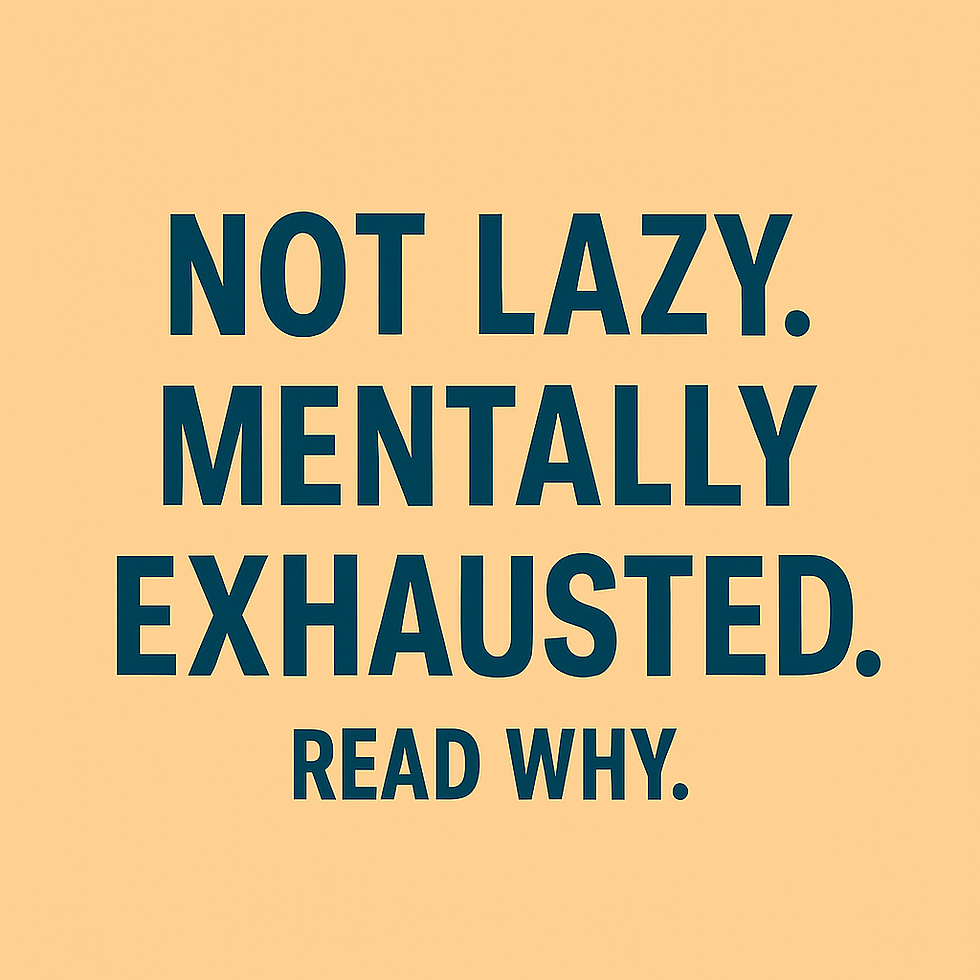Not Lazy. Mentally Exhausted. Read Why
- James Link

- Apr 2
- 3 min read

How many times have you heard someone say, “You just need to try harder” or “You’re not being productive enough”?
For a lot of us in the neurodivergent community, the problem isn’t laziness. It’s mental exhaustion — the kind no one else sees.
The Invisible Load of a Neurodivergent Brain
From the outside, we might look like we’re holding it together. But what most people don’t realize is how much energy it takes just to function in a world that doesn’t match our wiring.
There’s an invisible load we carry every single day:
Filtering overwhelming sensory input
Navigating unspoken social rules
Trying to mask traits that others may not understand
Constantly problem-solving in real-time
Managing emotional regulation and anxiety
Working hard to appear “normal” even when we’re struggling inside
That mental load is exhausting. By the time we sit down to complete a task, we may already be running on empty. So when others assume we just aren’t motivated — it completely misses the reality of what’s happening inside.
Motivation vs. Capacity: There’s a Difference
One of the biggest misunderstandings I see is the idea that if someone isn’t doing something, they must not care or want it badly enough.
But in reality, there’s a huge difference between not caring and not having capacity.
I’ve learned through my CBT training that this is where mindset work becomes critical. Cognitive behavioral tools help us recognize that what we often label as “procrastination” or “lack of discipline” may actually be signs of:
Executive functioning fatigue
Emotional overload
Mental burnout
Inner self-doubt or fear of failure
Sometimes the real barrier isn’t motivation at all — it’s a tired nervous system begging for recovery.
Reframing the Narrative with CBT
Cognitive Behavioral Therapy teaches us to identify and challenge those automatic negative thoughts that say, “I’m lazy,” or “I should be doing more.”
Instead, we learn to pause and ask:
What’s really going on beneath the surface right now?
What mental or emotional weight am I carrying?
What would it look like to support myself rather than criticize myself?
One powerful CBT strategy I’ve used is thought journaling, which helps me untangle emotion from fact and shift into a more compassionate mindset. Another is reframing — learning to replace self-critical thoughts with empowering truths.
It’s not about ignoring responsibilities. It’s about recognizing when your brain needs support, not shame.
Rest Is Not Laziness — It’s Maintenance
For neurodivergent people especially, rest is not a reward — it’s a necessary part of functioning.
When we don’t honor our limits, we risk crashing into burnout. But when we give ourselves permission to pause, reset, and recharge, we build resilience for the long term.
It’s time we stop measuring productivity by how much we push through and start recognizing the value of recovery, too.
Real Acceptance Means Changing the Conversation
This Autism Acceptance Month, I want to challenge a narrative that’s caused so many of us harm:
“If you’re not doing more, you must not care enough.”
That mindset erases the real struggle of mental fatigue — and it keeps people stuck in cycles of shame and burnout.
Instead, let’s normalize a different truth:
Neurodivergent brains require different pacing.
Motivation can coexist with exhaustion.
Success looks different for all of us.
And most of all — let’s stop assuming people aren’t trying. Sometimes, the hardest work is the invisible work of showing up at all.
If you’ve ever felt like you were drowning in expectations while barely keeping your head above water, know this:
You’re not lazy. You’re not broken.
You’re carrying more than most people will ever understand — and that takes strength.
Real acceptance means meeting people where they are — not where we assume they should be.





Comments